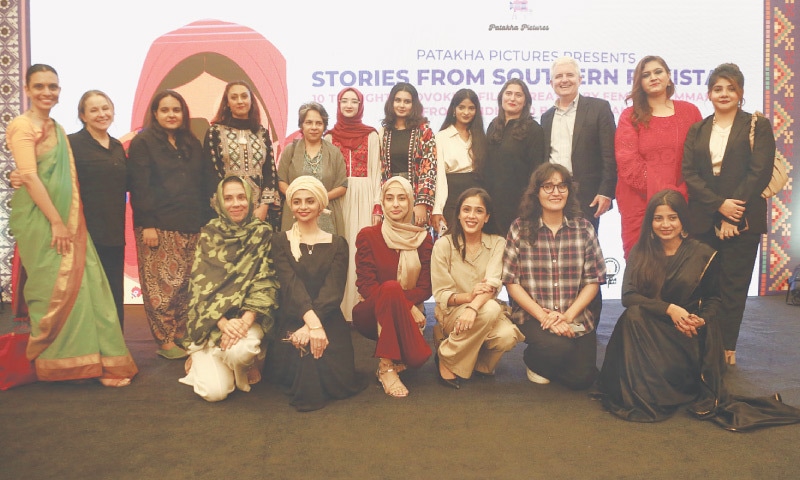KARACHI: The 10 films of 20 to 30 minute duration had their own merit, but getting to know the stories, challenges and struggles of the 19 talented female filmmakers, who so beautifully brought their subjects to the big screen, also deserve thunderous applause.
All of them stole the show at the closing ceremony celebrating the successful conclusion of Sharmeen Obaid-Chinoy’s Patakha Pictures’ largest filmmaking grant and mentorship programme ‘Stories from Southern Pakistan’, here on Friday.
This Rs10 million project, supported and funded by a grant from the US Consulate General in Karachi, aimed to empower, uplift and encourage the next generation of Pakistani women in film to create documentaries that push boundaries and start important conversations.
It was a project very dear to the two-time Academy Award-winning filmmaker’s heart, who shared how she also used to dream of becoming a filmmaker back in 2002, just like the emerging female filmmakers. “Patakha means firecracker. Through the venture I wanted to give others the wings to fly,” she said about Patakha Pictures.
Documentaries made by female filmmakers from Sindh, Balochistan captivate audience
Having a baby, dealing with the death of an uncle, overcoming personal misfortunes, and what not? Nothing could come in the way of the 19 very driven and aspiring women from Sindh and Balochistan as they went about shooting their films. Working in pairs, over several months, they also honed their skills and crafted their documentaries while also attending online filmmaking workshops, and in-person editing sessions with Noé Mendelle and Jesse Ericka Epstein.
The former is a member of the Academy of Motion Picture Sciences, and Director of the Scottish Documentary Institute and the latter, a Sundance Award-winning documentary filmmaker, and VMA Affiliated Faculty, at Emerson College.
The two-minute excerpts of the films had the audience captivated with their compelling subjects, unique perspectives, filming and clever editing.
Niswan-Nama by Zehra Nawab and Mariam Paracha explored the work of Tehrik-i-Niswan, a female-led performing arts troupe using theatre as a tool of activism. The story of this group is told through its members, including its founder, the graceful classical dancer Sheema Kermani.
Talking about her experience, one of the filmmakers, Zehra Nawab, said they were initially looking to tell the story of the artists and theatre performance. “But as we entered their space we gained a better understanding of the organisation and its work,” said Zehra, who in her beautiful green sari and a flower in her neatly tied bun, also looked like she had become a big fan of Ms Kermani.
Equipped with the tools and techniques to film their documentary, Nayyar – An Art Story, it was very clear from the start for Ayessha Quraishi to use her art teacher as her subject. Her partner here was also none other than Shalalae Jamil, the daughter of the subject Nayyar Jamil. Together they very ably traced the artistic career of Nayyar Jamil who had begun her journey as a painter and continued on to become a teacher, shaping and guiding innumerable students over multiple decades.
Of them Rani Wahidi, the filmmaker of Sculpted Defiance with her partner Mashal Baloch, had the audience in utter awe when she announced that she was entirely self-taught. “I never went to school because I am from Afghanistan where the Taliban were not in favour of educating girls. I taught myself the alphabet from hearing other children recite ABC. I taught myself how to read from pieces of newspaper, which I found in the trash, but I educated myself,” she beamed.
The rest of the 19 women filmmakers included Alina Rizwan, Alina Azhar, Aqsa Abdul Qadir, Amatullah Saeed, Kainat Thebo, Ayesha Abro, Zainab Asif, Aimen Khan, Mahwish Saeed, Saira Baloch, Rani Wahidi, Mashal Baloch, Yamna Waqar, Nafeesa Ali and Zainab Younas.
Speaking on the occasion, US Consul General Conrad Tribble said that he felt honoured to meet the filmmakers. “We are immensely proud to have supported this filmmaking project and to have helped in bringing the ambitions of the filmmakers to life,” he said.
Published in Dawn, September 23th, 2023
















































